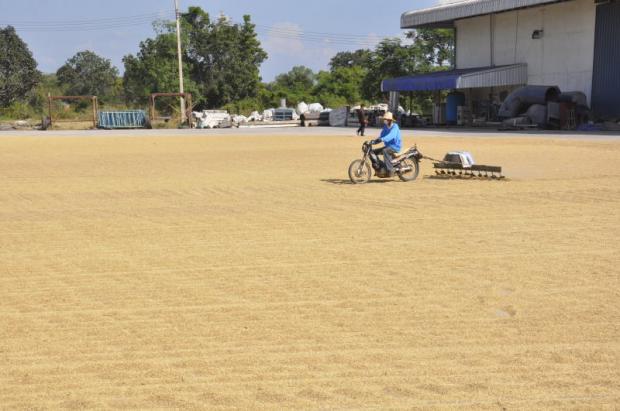
The Commerce Ministry is set to talk with the state-owned Bank for Agriculture and Agricultural Cooperatives (BAAC) about releasing hom mali fragrant paddy rice pledged under the bank's loan scheme, which was offered to farmers who delayed selling their stocks.
Boonyarit Kalayanamit, director-general of the Internal Trade Department, said the department will soon hold talks with BAAC on releasing some of the 900,000 tonnes of hom mali rice pledged by farmers under the bank's rice barn pledging programme, adding supply is relatively tight thanks to lower production and depleted state stocks.
Mr Boonyarit said the release should be made on a gradual basis to curb any negative effects on premium rice prices.
The BAAC has set aside more than 80 billion baht in loans and grants for rice farmers who delay selling their paddy to stabilise prices for the 2017-18 harvest season.
Under the 83.7-billion-baht loan and grant scheme, 21 billion has been offered to those who delay selling paddy, 3 billion was earmarked for cash handouts to farmers who store their paddy in barns for a designated period, 12.5 billion has been allocated for agricultural institutions that buy paddy from members to increase product value and 47.3 billion in grants is available to 3.9 million rice growers who have signed up with the Agricultural Extension Department to subsidise their harvesting costs.
Under the lending scheme, the state-back farming bank has offered credit based on average rice prices for the past three years -- 10,800 baht a tonne offered for hom mali and glutinous paddy, 7,200 per tonne for white rice paddy and 8,500 per tonne for Pathum Thani fragrant paddy.
Retail rice farmers are each limited to 300,000 baht in loans, while agriculture cooperatives, farmer clusters and community enterprises are capped at 300 million, 20 million and 5 million, respectively.
The government subsidises interest worth 453 million baht, but borrowers who do not repay loans from the BAAC within five months of taking them out must shoulder the remaining interest payments.
The programme is intended to delay the sale of 2 million tonnes of paddy during the annual harvest season.
Participating farmers who agree to hold their paddy receive 1,500 baht a tonne, while all rice farmers are granted 1,200 per rai for harvesting and rice-quality improvement costs, capped at 12,000 per family.
Mr Boonyarit said Thailand's rice production for the 2018/2019 season is expected to tally 30 million tonnes of paddy, down 1-2 million tonnes from the 2017/18 season. The drop is largely because of an anticipated drought.
"This year, domestic hom mali paddy prices are as high as 15,000-17,000 baht a tonne because of lower supply," he said. "Production of hom mali rice is expected to drop to only 7 million tonnes of paddy annually from an earlier projection of 9-10 million tonnes."
Charoen Laothamatas, president of Thai Rice Exporters Association, hailed the Commerce Ministry's plan, saying it is high time to raise the supply of hom mali rice on the market.
But he reiterated the release should be done on a gradual basis to prevent any price impacts.